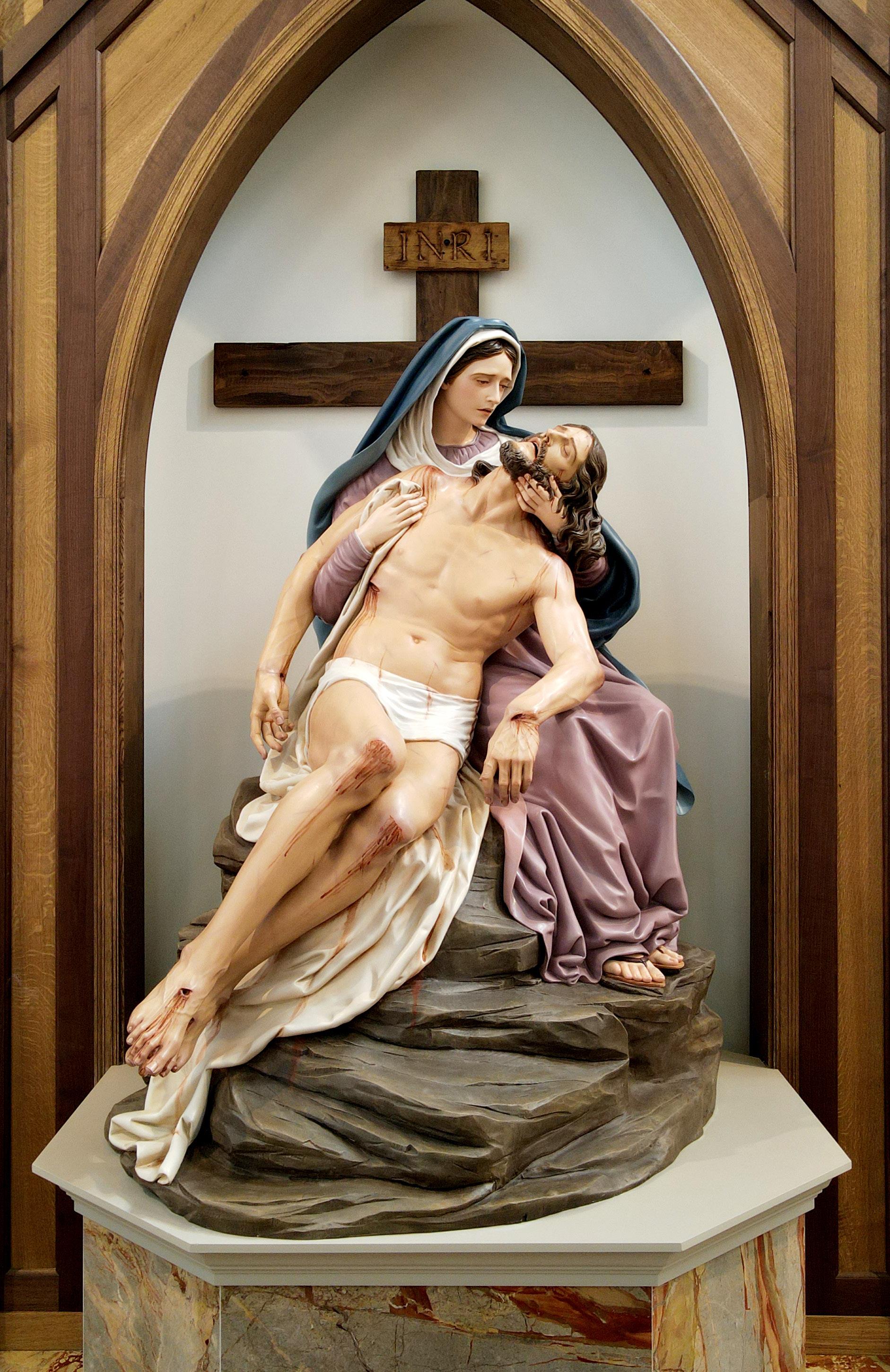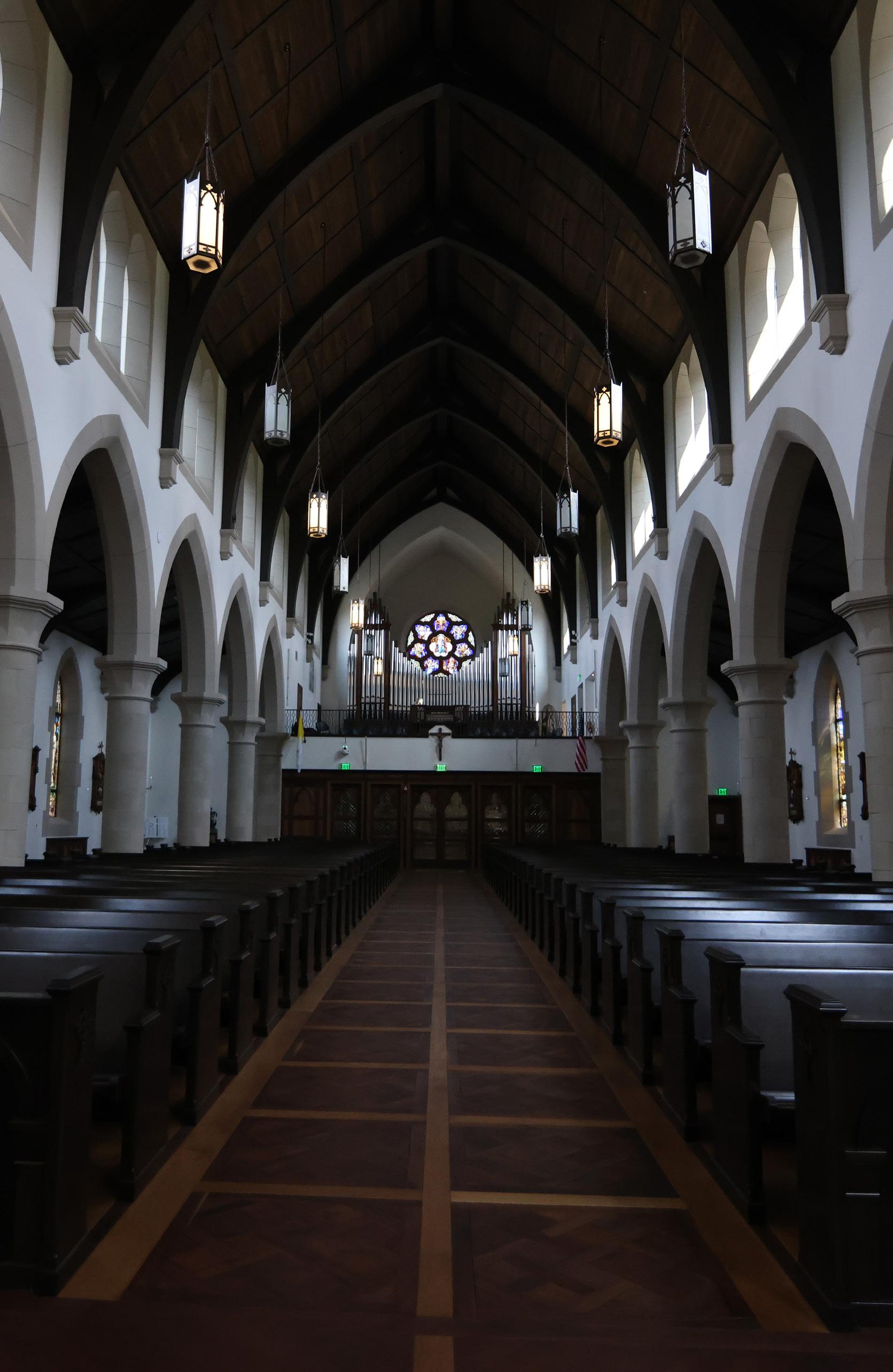BEAUTIFUL, AWESOME, AND THE GATEWAY TO HEAVEN
HOMILY • SUNDAY, JUNE 16, 2024
CHRIST THE KING CHAPEL • CHRISTENDOM COLLEGE
ROBERT CARDINAL SARAH


HOMILY • SUNDAY, JUNE 16, 2024
CHRIST THE KING CHAPEL • CHRISTENDOM COLLEGE
ROBERT CARDINAL SARAH

HOMILY • SUNDAY, 16 JUNE 2024
CHRIST THE KING CHAPEL • CHRISTENDOM COLLEGE

When President O’Donnell brought the cornerstone of this magnificent Christ the King Chapel to be blessed in Rome, our beloved Pope Benedict XVI, seeing the building plans, remarked: “It is beautiful.”
Truly, this is a magnificent edifice. Even Jacob, the cunning usurper, could recognize in his dream of a stairway resting on the earth and reaching Heaven, the presence of God, which he would name Bethel: “How awesome is this place! This is none other than the house of God and the gateway to Heaven” (Genesis 28,17).
This house of God opens the heavens to allow us to witness the glory of God. It is the ladder set on earth, whose top reaches to heaven, the door, the gate, the way of ascent to it. Here God is preached in the Word as the way of salvation, the way to Heaven and eternal happiness. Here, God is adored in the Sacred Liturgy. Here, in the sacraments, God grants His presence to His people, and offers them communion with him, above all in the Most Holy Eucharist.
In the light of today’s Scripture Readings, let us reflect further on how Christ the King Chapel is “beautiful,” “awesome,” and “the gateway to Heaven.”
Three simple points.
In our Gospel passage, Jesus compares the Kingdom of God to a mustard seed. In hot countries, such as Judea, where Jesus was preaching, the tiny mustard seed grows into a tree of huge proportions. A man on a horse can ride under its branches; large furnaces are fueled by its boughs; flocks of birds sit on its branches, and its branches do not break under the weight of a man. The seeds of the mustard tree were considered medicinal and for this reason the plant itself was widely known.

This is our first lesson. Jesus Christ is the mustard seed. Christ was the tiny seed, born in Judea, a land remote and insignificant in political terms. For thirty years, He lived a hidden life in obscure Nazareth, in despised Galilee, in the home of a carpenter. By His teaching, He attracted to Himself a few disciples from simple fishermen and publicans. Having given Himself over into the hands of enemies, Christ ended up crucified on Mount Calvary. But He was raised from the tomb, ascended to the Father, and His Church has spread throughout the whole earth, like a great tree.
In Him alone then, as in a seed itself, the whole Church was originally contained, and from Him, the Church has spread.
Here we see perfectly fulfilled the Prophecy of Ezekiel in today’s First Reading:
I, too, will take from the crest of the cedar, from its topmost branches tear off a tender shoot, and plant it on a high and lofty mountain; on the mountain heights of Israel, I will plant it. It shall put forth branches and bear fruit and become a majestic cedar. Birds of every kind shall dwell beneath it, every winged thing in the shade of its boughs.
At the center of everything is Jesus Christ. Christendom College knows this for enshrined in your very name is Jesus Christ. Christ is the center of a Christendom education. Christendom honors Christ the King with your motto, “To restore all things in Christ.” This is why you have wished to make this Chapel the towering and immovable heart of your campus. You have named the twelve bells, installed in the steeples, after the twelve apostles. The Church, which Christ founded with a divinely ordained structure, no one has the right to change. As G.K. Chesterton tells us: “We do not want a Church that will move with the world. We want a Church that will move the world.”

Let us pass to a second point in our reflection on how this house of God, Christ the King Chapel is “beautiful,” “awesome,” and “the gateway to Heaven.”
The founder of Christendom College, Warren Carroll, spoke prophetic words even some 50 years ago. I quote him: In Western civilization, Christendom is going out of style and even out of knowledge. Many have never heard it, cannot even pronounce it, much less explain and serve what it stands for. At this moment of history, Christendom can exist only in small and self-contained spaces. But a Christian in such a place never settles for it, never hides in it, for he has a message to bring to the world.
Let us look around us today. Western society has chosen to establish itself without God. A world without God is a world of darkness, of lies and of selfishness. Western society does not have enough love to bring more children into our world, to protect them in their mother’s womb, to protect them from the aggression of pornography. Western society no longer knows how to respect its elderly, accompany unto death its sick, make room for the poorest and the weakest. Society is abandoned to the darkness of fear, sadness, and isolation.
She has nothing to offer but emptiness and nothingness. Western society allows the proliferation of the maddest ideologies that deny human nature and destroy the family ... structures from the United Nations, which impose a new global ethic, play a decisive role, and have today become an overwhelming power, spreading through the airwaves through the unlimited possibilities of technology. In many Western countries, it is a crime today to refuse to submit to these horrible ideologies. This is what we call adaptation to the spirit of the times, conformism, the cradle of an ethical and moral terrorism more virulent and more destructive than Islamist terrorism.

So, as Warren Carroll said, Christendom “has a message to bring to the world.” We must proclaim to the world that our hope has a name: Jesus Christ, the only Savior of the world and of humanity. Everything in this Christ the King Chapel points to the name of Jesus Christ: the Gothic architecture and Crossing Tower, the shrines, the sculptures, the 115 stained-glass windows bearing the saints, the towering steeples, the swinging botafumeiro with smoking incense that rises to the heavens as a prayer… everything proclaims the joy of being saved and loved by God in His Son, Christ the King.
This is the mission of Christendom College. In the face of the chaos caused by the toxic rejection of the Truth, you form men and women who are prepared to transform the culture and the world—men and women who know Jesus Christ intimately, well-educated and formed in virtue. Today, I see this visibly all around me.
Saint Paul speaks of the virtue of fortitude and the ultimate reason for it in today’s Second Reading: We are always courageous … we aspire to please him, whether we are at home or away. For we must all appear before the judgment seat of Christ, so that each may receive recompense, according to what he did in the body, whether good or evil.
This moves us to our third and final reflection on how this house of God, Christ the King Chapel is “beautiful,” “awesome,” and “the gateway to Heaven.”
Whoever enters the doors of this Chapel is brought closer to the Eucharistic Heart of Jesus. The majesty of this house of God speaks of contemplation, adoration, filial fear, and love in the presence of God’s greatness.
Everything culminates in the ornate High Altar of Repose, in the Consecration where together, facing the altar, our gaze is directed to the host, to the Cross, and we commune in silence, in recollection and in adoration.

Dear friends, may every liturgy in this beautiful and awesome Chapel, the gateway to Heaven, enable us to taste the silent and transcendent presence of God, and turn us towards the Lord. The liturgy is the place where man meets God face to face. In the ordinary form, just as in the extraordinary form of the Roman rite, the essential thing is to turn to the Cross, to Christ, our East, our Everything and our only Horizon: “I am the way, the truth, and the life. No one comes to the Father except through me” (John 14,6). Whether in the ordinary form or the extraordinary form, let us always celebrate, as on this day, according to what the Second Vatican Council teaches: with a noble simplicity, without useless additions, without factitious and theatrical aesthetic, but with the sense of the sacred, with the primary concern for the Glory of God, and with a true spirit of sons and daughters of the Church of today and of always!
Today’s Psalmist proclaims: “It is good to give thanks to the Lord, to sing praise to your name Most High!” (Psalm 92,1). On this Dies Domini, this “day of the Lord,” let us give thanks that Christ the King Chapel allows us to encounter Him in beauty and with reverence.
Let us offer thanksgiving that at Christendom College, students can be instructed in Christ’s holy doctrine, which, like the mustard-seed, has grown to be a large tree, spreading over the whole earth. Let us beseech our Heavenly Father that he grants, under the shadow of this tree, in His holy Church, we may ever rest securely, cling to her faithfully, and be penetrated, as by leaven, with her pure and holy doctrine and bring forth pleasing fruits of faith, hope and love. May the Kingship of Jesus Christ and the Queenship of our Blessed Mother, Sedes sapientiae, be our guide and protection for ever and ever. Amen.

Robert Cardinal Sarah delivered this homily during his visit to Christendom College in the summer of 2024 for a conference on Pope St. John Paul II's legacy. In his homily, the cardinal reflected on how Christendom College—particularly through the beauty of the Christ the King Chapel—is offering us the answer to many of the world's challenges.

Robert Cardinal Sarah, born on June 15, 1945, in Ourous, Guinea, is a renowned Catholic prelate and theologian. Ordained a priest in 1969, he became Archbishop of Conakry in 1979, where he championed human rights and social justice. In 2014, he was appointed Prefect of the Congregation for Divine Worship and the Discipline of the Sacraments. A prolific author, Cardinal Sarah’s works, including God or Nothing and The Power of Silence, have touched countless readers worldwide. Known for his deep spirituality and defense of the liturgy, Cardinal Sarah continues to be a source of inspiration for all Catholics.